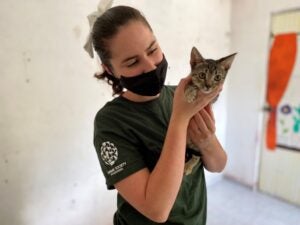
Aguascalientes, MEXICO—Humane Society International/Mexico provided relief to animals after a fuel tanker crash sparked a huge blaze in Aguascalientes, Mexico, on Wednesday, Oct. 26. The accident produced a giant fuel fire engulfing dozens of homes and sparking the evacuation of 1,500 people. Although thankfully no human lives were lost in the explosion, sadly 22 animals were killed by the fire and more than 100 more were impacted by the emergency.
HSI/Mexico’s team on the ground coordinated with local authorities to facilitate access to rescue pets whose owners had been evacuated to the emergency shelters, and to reunite them with their families. In addition, HSI/Mexico provided pet food, cages, dishes and other essentials so that animals were properly cared for. The organization also coordinated the help of the local veterinary association, other animal protection groups and government officials.
Over 100 pets were affected by the emergency, including 55 dogs, nine cats, 31 birds, one rabbit and 15 fish. Nearly 20 animals are currently being held in temporary shelters, while the rest have been reunited with their families.
Felipe Márquez, HSI/Mexico’s animal cruelty program manager, said: “It is heartbreaking to see people and animals suffering in a disaster such as this. These animals play a crucial role in the lives of the people affected by the explosion, who consider them members of their family. Safely reuniting people and pets at a time like this brings all concerned immense emotional comfort, so we are grateful to the Aguascalientes authorities for including animal protection in their disaster response and for coordinating with animal protection groups such as HSI/Mexico. The help we are able to provide is making the difference in a very dire situation for the people and animals affected by this terrible accident.”
HSI responds to disasters around the world to assist animals and communities in need. For example, in 2018, HSI stepped in to provide emergency treatment to dogs, cats, chickens, horses and other animals affected by the Volcan de Fuego eruptions in Guatemala, and in 2017 HSI helped more than 6,200 animals affected by deadly earthquakes in Mexico. Most recently, members of HSI/Mexico were deployed to Poland and Romania to assist HSI’s local team in helping refugees with pets who had escaped the war in Ukraine.
ENDS
U.S media contact: Melissa Smith: 231–360–7676, mmsmith@humanesociety.org









